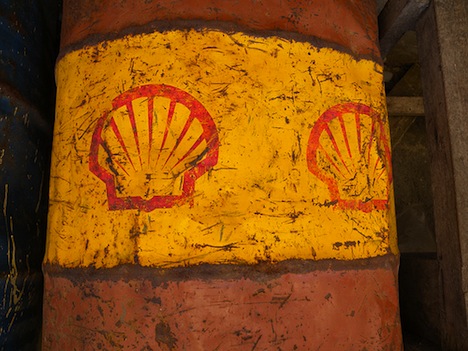
Nigeria: Shell’s New Human Rights Abuses
 Often the story of Shell’s atrocities in Nigeria has focused on its complicity in the death of the Ogoni Ken Saro-Wiwa, or the human rights abuses that were committed in the mid-nineties.
Often the story of Shell’s atrocities in Nigeria has focused on its complicity in the death of the Ogoni Ken Saro-Wiwa, or the human rights abuses that were committed in the mid-nineties.
But now a great new report from the oil industry watch-dog Platform, and published in coalition with a number of NGOs, has looked at Shell’s more recent misdemeanours in the Delta over the last decade.
Once again it makes disturbing reading for the oil giant.
The report – Counting the Cost – exposes that nearly sixteen years after Saro-Wiwa’s death, Shell’s continuing close relationship with the Nigerian military still exposes the company to charges of complicity in human rights abuses in the Delta, including in Ogoniland.
According to Platform’s report, which is based on an extensive field trip to the Delta last year, Shell continues to rely on Nigerian government forces who have perpetrated systematic human rights abuses against local residents, including unlawful killings, torture and cruel, inhumane and degrading treatment.
But Shell is not just implicated in violence from the Nigerian authorities. It also is implicated in violence carried out by Nigeria’s notorious criminal gangs.
Testimony and contracts seen by Platform implicate Shell in regularly assisting armed militants with lucrative payments. In one case from 2010, Shell is alleged to have transferred over $159,000 to a group credibly linked to militia violence.
The report includes eight cases studies of violence and collusion. One concerns the town of Rumuekpe in Rivers State. Between summer 2005 and November 2008, Rumuekpe was torn apart by a destructive crisis. It is estimated that at least 60 people, including women and children, were killed by inter-communal conflict.
Armed gangs waged pitched battles over access to oil contracts and payments, which Shell allegedly distributed to whichever gang controlled access to its infrastructure.
One gang member, Chukwu Azikwe, told Platform: “We were given money and that is the money we were using to buy ammunition, to buy this bullet, and every other thing to eat and to sustain the war.” He said his gang and its leader, SK Agala, had vandalised Shell pipelines. “They will pay ransom. Some of them in the management will bring out money, dole out money into this place, in cash.”
The gang became locked in competition with a rival group over access to oil money, with payments to one faction provoking a violent reaction from the other. “The [rival gang] will come and fight, some will die, just to enable them to also get [a] share. So the place now becomes a contest ground for warring factions. Who takes over the community has the attention of the company.”
These allegations of ex-gang members are largely substantiated by the testimony of a company official. Platform interviewed a Shell manager who confirmed that during one of the worst years of violence in 2006, Shell awarded six different types of contract in Rumeukpe, worth thousands of dollars each month .
Platform’s report offers a damning assessment: “Shell was highly likely to be aware that it was helping to fuel the conflict in Rumuekpe, since company workers visited the community on a regular basis. Even if Shell was somehow unaware of the violence, media reports were publicly available.
It adds: “The Rumuekpe crisis was entirely avoidable… Shell operated for decades without an MoU, polluted the community and distributed ‘community development’ funds through an individual who had lost the confidence of the community. Once conflict erupted, Shell paid the perpetrators of gross human rights abuses as long as they controlled access to oil infrastructure. The cumulative impact of Shell’s mistakes was devastating.”
Shell must not shoulder all the blame either. In the absence of proper supervision and controls, Shell contractors, including multinationals like Halliburton, Daewoo and Saipem, have replicated many of Shell’s mistakes.
The report’s author, Ben Amunwa from Platform said: “This research sheds new light on Shell’s active role in human rights abuses during a decade of terrible violence in the Niger Delta. Shell claims it has nothing to do with the crisis, but the company is involved in widespread abuses and militarisation.”
Shell has reacted in a typically belligerent and arrogant fashion. “We have long acknowledged that the legitimate payments we make to contractors, as well as the social investments we make in the Niger delta region may cause friction in and between communities,” a spokesman said. “We nevertheless work hard to ensure a fair and equitable distribution of the benefits of our presence.”
